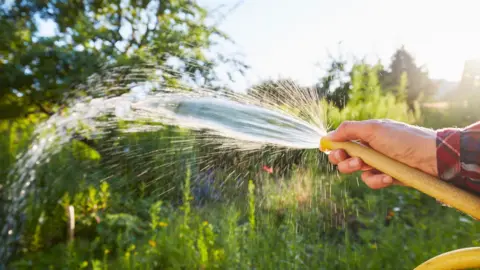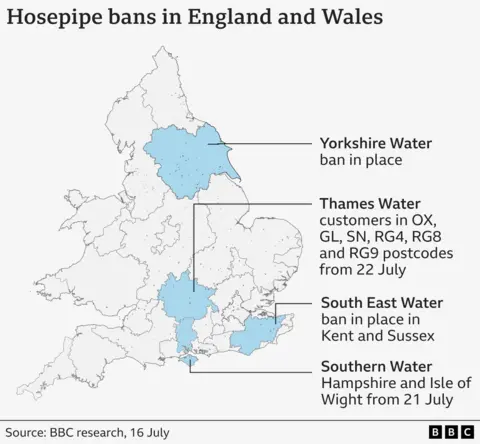South East hosepipe ban comes into force
 Getty Images
Getty ImagesA hosepipe and sprinkler ban affecting more than 1.4 million people has come into force.
South East Water said demand for drinking water had reached "record levels" since May due to extended spells of warm and dry weather.
The temporary ban will affect households in Kent, East Sussex and West Sussex, the firm said.
Under the restrictions, people are prevented from using hosepipes for watering their gardens, washing cars, windows and patios, or filling swimming and paddling pools.
Anyone flouting the restriction could be fined up to £1,000.
South East Water's head of water resources Nick Price told BBC Radio Kent: "We're trying to take the pressure of the drinking water supply so there's enough for everyone."
He added: "Prosecution is very much a last resort. I'm pleased to say most people are really understanding and have done what they need to do."
The firm said it saw the highest levels of water usage so far this year on 30 June, reaching 680-million litres - 105 million litres of water a day more than the average for summer.
It said it continued to monitor the situation in its Western region, where it serves customers in parts of Surrey, Hampshire and Berkshire.
Mr Price added: "We're keeping a really close eye on the forecast."
 BBC/Phil Harrison
BBC/Phil HarrisonBut some residents in Kent said they felt the company needed to take other measures before punishing customers.
Dina Bonarius, from Tonbridge, says the ban means it will take her an extra hour and a half to water her garden using a watering can rather than a hose.
She said: "South East Water should fix all of the leaks in their system as soon as possible.
"We're doing all we can to save water so why aren't they?"
It follows a ban from Yorkshire Water which began 11 July – the first of 2025 – with Thames Water planning a ban from 22 July.
Southern Water's ban – affecting almost one million customers across Hampshire and on the Isle of Wight – will come into effect from 21 July.
In May, Southern Water, SES Water and Affinity Water told the BBC they did not expect to introduce water use restrictions, such as hosepipe bans, in 2025.

It comes as the UK has experienced three heatwaves so far this year, with the BBC Weather Centre confirming 1 July as the hottest day of the year when 35.8C was recorded in Faversham, Kent.
The Environment Agency has already said that some areas of the UK are either in drought or a "state of prolonged dry weather", after the second driest spring on record for England and the sixth overall across the UK.
Periods of dry weather and low rivers can have consequences for the environment and wildlife," the Environment Agency said.
Hot and dry weather can increase wildfires, severely damaging vulnerable areas of heathland and moorland," a spokesperson said.
"Crop failure is also a major impact of drought while low water levels make navigation difficult on canals and some rivers."
None of the water companies with hosepipe bans in place have specified exactly when restrictions will be lifted.
Will there be further hosepipe bans?
While some of the UK has experienced rain since the end of the last heatwave, the long-term forecast for some may be more concerning.
Southern and eastern areas of the UK are expected to experience drier than normal conditions through the next month until mid-August.
While droughts are complex to forecast, it may give an indication that with drier than average weather on the way, there could be further restrictions this summer.
Follow BBC Kent on Facebook, on X, and on Instagram. Send your story ideas to [email protected] or WhatsApp us on 08081 002250.

Get our flagship newsletter with all the headlines you need to start the day. Sign up here.
